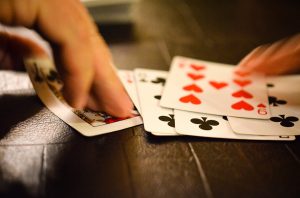
If you suddenly tell a stranger in the middle of a conversation that you're a professional poker player, you'll probably get a familiar reaction. He will usually start telling you about his friends' sisters' exes who play poker, or that he was once in Vegas, he might ask if you've played in a big tournament, what your parents think of your career, speculate that you're probably good at maths, and so on. But one of the most annoying statements is "Oh, you must have a very good poker face".
The image of the "poker face" has become so widely recognised in our culture that it is practically linked to the game itself. If you know what poker is, you know what a poker face is. But this expression does not only symbolise the role played in poker. What we call a poker face would have been familiar to Roman stoics, Zen samurai, warriors, mystics, gamblers and thieves, taking a look at the whole of human history.
The poker face is a unique symbol of humanity. It is a mask of emotionlessness "worn" over the face, hiding the personality underneath. The poker face floats somewhere above the game, detached from fear, anger or despair, even though the rest of us seem to feel it. That's part of the explanation why the profession of "poker player" seems so seductively glamorous, almost subhuman, to many.
So when people ask me "how can I improve my poker face?", I feel like I must have the answer. But what can I answer? The truth is that there is no way to have a better poker face, or rather no special way. Of course, there are many little tricks that can be used in this situation to navigate between the tilt and the exaggerated joy. Of course, you can practise in front of a mirror, visualise the action or something like that. And yes, you should close your mouth, relax your muscles, watch your eye movements, stare in front of you, breathe consciously, don't talk and all that. But in reality, all this is only a small part. If you are one of those players who show signs of emotional weakness, these little tips won't change you in the short term.
Emotions are like a rock in your mind. Formed by erosion, by the forces of the world over the years, the contours of this rock show the history of your personality. Some players have smoothed out the emotional edges of their rocks and have a good poker face when they started playing poker, while others still have jagged and sharp edges that seem to give everything away. It is simply a lottery of environment and genes. And there is not much to talk about here.
If you want to have a good poker face, the first thing you have to do is stop feeling those emotions. Once you start playing poker, the best way to defuse your emotions is through strength of character. Gossip, the passage of time, the thousands of poker hands in front of you will weigh on your mind. So be aware, observe yourself, learn to form new beliefs, adapt to your environment, try many other different techniques to improve and control your emotional expression. But ultimately what you can do is wait. Play, feel and suffer. If you stay in it long enough, eventually your traits will be polished. It takes time, so be patient. How can you become more patient? This is the only good quality that is entirely up to you. Be calm, let what happens happen. If you are emotionally weak, it's okay, be weak. But keep playing. Don't stop trying, don't give up when you make a mistake. We were all once where you are now. If you come back tomorrow, and then the next day, then one day, all that will change.





